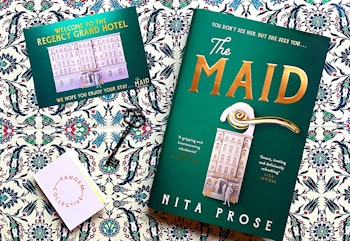Working in the publishing industry, Nita Prose has spent her career surrounded by stories. Beginning as an intern, she worked her way from photocopying manuscripts to becoming vice president and editorial director at Simon & Schuster in Toronto. After a chance encounter with a hotel maid in London, Nita hurried to write down ideas that would develop into her debut novel. The resulting murder mystery The Maid is now a much-loved bestseller, soon to be adapted into a film. We asked Nita about her writing routine, where the idea for The Maid came from and her tips for making time to craft a novel while working.
How did you find the time to write a novel when you had a fulltime job? Do you have a specific writing routine?
I’ve been an editor for over 15 years, and one of the things that the profession has taught me is time management! When I’m writing, I wake up at 5 a.m., make coffee, and squirrel myself away in my office (which I call “The Cave”). I love writing at this hour, when it’s still dark out and my mind is in a liminal state between waking and dreaming. I find there’s something I can harness there that is untouched by the constraints and impositions of reality, a creative energy that is fresh and free.
How did you find the energy and stay motivated?
Coffee! (And then I switch to tea at 10 a.m.)
Where did your initial idea come from?
This novel was inspired by a chance encounter with a maid at a hotel while I was on a business trip about two years ago. I was staying at a London hotel. One day, after a meeting outside the hotel, I returned to my room and startled the maid who was folding the jogging pants I’d left in a tangled mess on the bed (embarrassing!). The second I entered the room, the maid jumped backward into a shadowy corner. It occurred to me in that moment what an intimate and invisible job it is to be a room maid. Simply, by cleaning my room every day, this maid knew so much about me. But what did I know about her? On the plane home a few days later, my protagonist Molly’s voice came to me. I grabbed a pen and a napkin, and wrote the prologue in a single burst. I didn't know it at the time, but I'd just begun my debut novel.

How long were you thinking about writing the book before you sat down and did it?
I’ve always had books in me, but as an editor and ghostwriter I’ve concentrated on helping others tell their stories. When Molly’s voice entered my head, I knew it was time to pen my debut.
After you finished writing it, how did you get it published?
My years of experience as an editor mean I’ve been steeped in story structure, narrative and the business aspects of publishing. Still, that didn’t mean there weren’t psychological hurdles I had to get over in order to write and publish my debut novel. When I finished the first draft of The Maid, I was terrified to share my work. Why? Because all of my professional colleagues would know about it! I kept running through scenarios where I’d receive horrible rejections from agents and publishers who, always polite, would call my work “lovely” and then “regrettably decline” while eye-rolling internally. Eventually, though, I put my big girl boots on and pressed send. I was thrilled when my dream agent decided to take me on. She understood my novel not only as a mystery but as “uplit”—a novel driven by a life-affirming spirit of hope. And that’s what I want readers to carry away with them once the last page is turned: hope. I suppose it was hope, too, that made me get over my own fears and share my manuscript in the first place! After I’d secured an agent, my manuscript was sent out to various publishers in different countries. I was completely shocked and delighted (as Molly would say) when there was strong interest in my work.
How has your day to day life changed since it was published?
Very little has changed, except that I’ve stepped out from invisibility. As an editor, it is my job to toil in the shadows and to push my authors into the light. I’ve had to learn how to be present in an all-new way, including on social media.
Do you have plans to write any more fiction?
I have a few different projects in the hopper, but true to form, I’m going to leave the details a bit of a mystery. On the movie front, however, I can say that I’m very excited that Universal Pictures has optioned the book and that Academy Award nominee Florence Pugh is set to star as Molly. I cannot wait to see The Maid come to life on the big screen!
What are your tips for anyone else who wants to write a novel around their fulltime job?
Writing a novel requires an enormous amount of time. Anyone mad enough to pursue writing while also holding down a full-time job will likely have to find ways to cut out other activities just to find the time. Let’s just say that when I’m writing, I’m not watching a lot of Netflix or whiling away luxurious free hours—or even minutes—doing anything but writing.
To read more of Nita’s wonderful words, pick up a copy of her debut novel, The Maid. If her tips have inspired you, our notebooks are ready to be filled with your own story ideas.

















